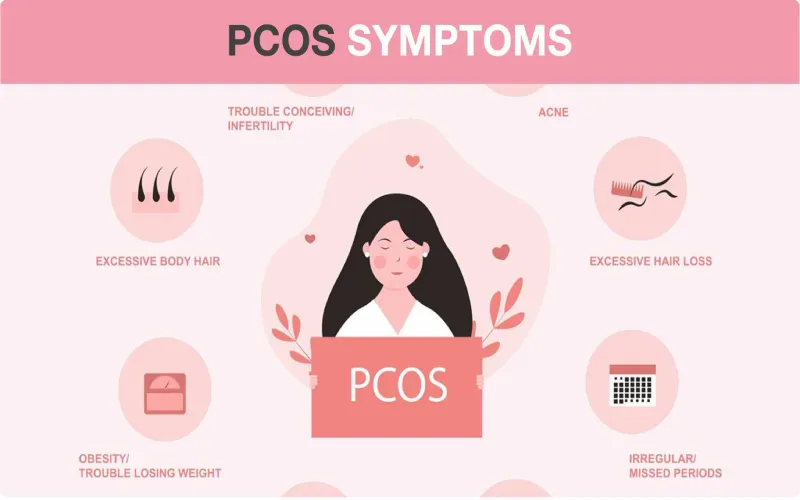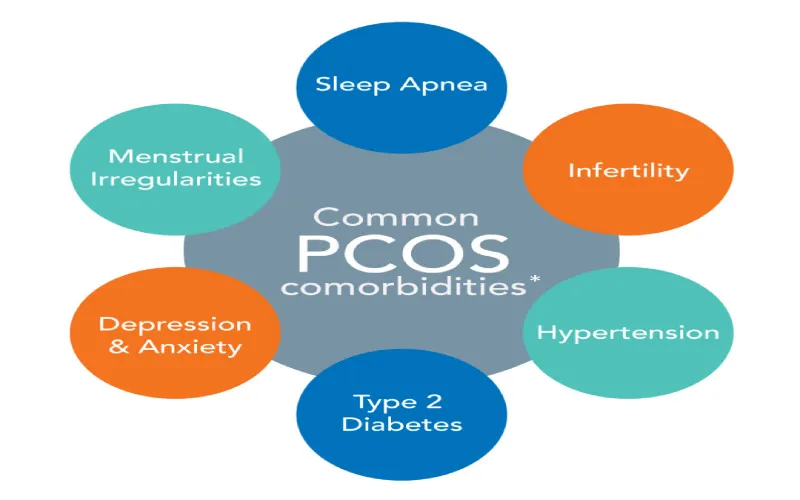PCOSCO: The Most Critical Comorbidities That You Should Know About
6 min read
Polycystic Ovary Syndrome, or PCOS, is a condition that affects many women and can have far-reaching implications for their health. In this article, we’ll be exploring the most common comorbidities associated with PCOS and how they can affect your health. We’ll also discuss why it’s essential to be aware of these issues and take steps to reduce their impacts on your life.
Table of Contents
The prevalence of PCOSCO

PCOS affects an estimated 5 to 10% of reproductive-aged women, making it one of these people’s most common hormonal disorders. While the causes of PCOS are not fully comprehended, it is thought to be related to various genetic and environmental factors.
There is no single test that can diagnose PCOS. Still, the most common way to diagnose the condition is by looking for signs and symptoms such as irregular periods, excess facial and body hair growth, and ovaries that contain small cysts. PCOS can also lead to fertility problems and an increased risk for certain types of cancer, so it is essential for women who think they may have PCOS to see a healthcare provider for diagnosis and treatment.
PCOSCO: Problems that face women with PCOS

There are several problems that women face with PCOS. The most common and well-known problem is fertility issues. Women with PCOS often have difficulty becoming pregnant and may need fertility treatment.
Another common problem associated with PCOS is weight gain.
Women with PCOS are at an increased risk for obesity and may struggle to lose weight. To help manage this, it is essential to do a patch test first to understand the root cause of the weight gain. This can help you to better understand your PCOS and develop an appropriate plan to address the weight gain. It can lead to other health problems, such as diabetes and high blood pressure.
PCOS can also cause irregular periods and excess hair growth on the face and body. Many women with PCOS suffer from low self-esteem due to these physical changes. Also, PCOS can increase the risk for certain cancers, such as ovarian cancer.
It is not uncommon for women with PCOS to experience mental health issues and emotional problems due to the physical symptoms and related challenges they may face.
If you are struggling with any of these problems, you must talk to your doctor. Treatments available can help improve your symptoms and quality of life.
How to manage comorbidities in PCOS

A few key comorbidities are often associated with PCOS, and it is essential to be aware of them to best manage the condition. These comorbidities include insulin resistance, obesity, type 2 diabetes, high blood pressure, dyslipidemia, and sleep apnea.
Insulin resistance is a common issue in PCOS and can often lead to type 2 diabetes. It is essential to monitor your blood sugar levels and work with your doctor to keep them under control. Obesity is another common comorbidity of PCOS and can contribute to insulin resistance.
Maintaining a healthy weight through diet and exercise is crucial for managing PCOS. High blood pressure is another comorbidity that can be associated with PCOS. Be sure to monitor your blood pressure levels and talk to your doctor about ways to keep them under control. Dyslipidemia, or abnormal lipid levels in the blood, is also a common comorbidity of PCOS. Please work with your doctor to monitor your lipid levels and make sure they stay within a healthy range.
Finally, sleep apnea is a severe comorbidity that can be associated with PCOS. If you think you may have sleep apnea, it is essential to talk to your doctor about it to get proper treatment.

There are a few key things to remember when it comes to diet and exercise if you have PCOS. First, you need to make sure that you are getting enough protein. Protein helps to regulate insulin levels and can also help to reduce inflammation. Good protein sources include lean meats, eggs, fish, legumes, and tofu.
In addition to getting enough protein, you also need to ensure you are getting plenty of fiber. Fiber helps to regulate blood sugar levels and can also help to reduce insulin resistance. Good sources of fiber include vegetables, fruits, whole grains, and legumes.
Finally, it is essential to get some exercise every day. Exercise helps to boost metabolism and burn calories. It can also help to reduce insulin resistance. Try to get 30 minutes of moderate-intensity exercise every day.
Inventions that help with the symptoms of PCOS

Several inventions help with the symptoms of PCOS. One such invention is the Insulin Resistance Diet. This diet helps to regulate blood sugar levels and reduce insulin resistance. Another invention is the Birth Control Pill. This pill helps to regulate hormone levels and prevent pregnancy. Finally, there is the Metformin medication. This medication helps to control blood sugar levels and improve insulin sensitivity.
Tips for living a healthy lifestyle with PCOSCO
A diagnosis of PCOS can be overwhelming, but there is hope! Here are some tips for living a healthy lifestyle with PCOS:
Eating a nutritious diet

Eating a nutritious diet is critical for managing PCOS and maintaining overall health. Make sure to include plenty of fresh fruits and vegetables, whole grains, lean protein, and healthy fats. And limit sugary and processed foods as much as possible.
Exercise regularly:

Exercise is another essential part of managing PCOSCO and improving your overall health. It can help to regulate your hormones, reduce insulin resistance, and promote weight loss. Aim for at least 30 minutes of moderate-intensity exercise most days of the week. To control PCOS and symptoms, maintain a healthy diet and weight.
Manage stress:

Stress can exacerbate symptoms of PCOSCO, so finding ways to manage it is essential. Try relaxation techniques such as yoga or meditation, or talk to a therapist if you’re feeling overwhelmed.
Get enough sleep:

Getting enough sleep is crucial for managing PCOSCO and improving your overall health. Aim for 7-8 hours of sleep each night to help reduce stress levels and improve hormone regulation.
CONCLUSION
PCOS can have serious long-term health complications, so it is essential to learn about the most common comorbidities associated with PCOS. Understanding and recognizing these issues will help you better manage your condition and reduce your risk of further complications. If you are currently living with PCOS, consult a healthcare professional for more detailed information on how to best manage your condition.
Frequently Asked Questions
PCOS, or Polycystic Ovary Syndrome, is a hormonal disorder that affects women of reproductive age. It is characterized by the presence of cysts on the ovaries, irregular menstrual periods, and high levels of male hormones (androgens).
The most common symptoms of PCOS include irregular or absent menstrual periods, fertility problems, excess body hair growth, acne, and weight gain. Other symptoms may include thinning hair, dark patches of skin on the neck or other areas, and skin tags.
The exact cause of PCOS is unknown, but it is thought to be related to a combination of genetic and environmental factors. Insulin resistance, inflammation, and hormonal imbalances may also play a role in the development of PCOS.
PCOS is typically diagnosed based on the presence of certain signs and symptoms, as well as the results of certain medical tests. These may include a pelvic exam, blood tests to measure hormone levels, and imaging tests such as an ultrasound to look for cysts on the ovaries.
There is no cure for PCOS, but the condition can be managed with a combination of lifestyle changes, such as diet and exercise, and medication. These may include birth control pills to regulate menstrual periods and improve symptoms, as well as medications to help with insulin resistance and fertility. In some cases, surgery may be recommended to remove cysts or to address other specific concerns.






